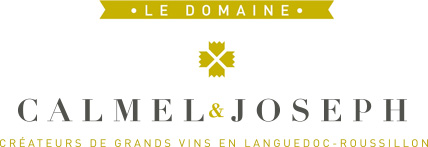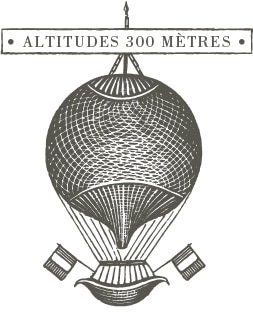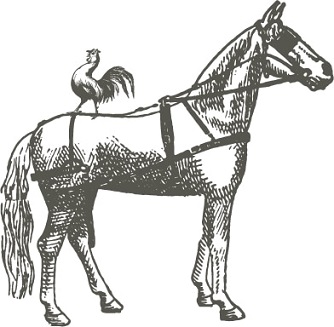In the heart of 200 uninterrupted hectares the Domaine Calmel & Joseph sits in a remarkable geographical position. At altitudes near to 300 metres, the cultivated plots are surrounded by richly diverse woodland and wild Mediterranean scrub ...
- A traditional Languedoc farmstead marked by history
Domaine is a former farmstead, typical of the Languedoc, first mentioned in a deed of property dated the 26 July 1577 belonging to the nobleman Jehan de Calmès, Lord of Saint Jullia. In the course of its history it was known by several different names, including Borde Neuve and La Madone. It was a classic farmstead of its time, with around fifteen hectares on which cereals were grown, mainly wheat, but also oats, barley, malt and lentils. There were also olive groves, sheep flocks kept for their wool, and coppices for the provision of wood. Vines began to be cultivated on the estate in the 16th century, but purely to make wine for personal consumption. Roman remains can still be seen today in the scrublands surrounding the Domaine.
- A privileged position : A high-altitude estate in the image of our Languedoc Roussillon parcel selections, with favourable soils, orientation and climate.
In the heart of 160 uninterrupted hectares, the Domaine sits in a remarkable geographical position on the threshold of the Val de Dagne, at the foot of the Alaric mountain and the Hautes Corbières.
At altitudes ranging from 240 to 300 metres, the cultivated plots are surrounded by richly diverse woodland and wild Mediterranean scrub.
The rolling hills and valleys essentially composed of sandy clay and chalk with outcrops of limestone rock allow each type of vegetation to find its ideal situation and orientation.
The estate is a complex mix of geological and climatic influences at the confluence of the terroirs of the Corbières, Limoux, the Malpère, the Cabardès and the Minervois.
- An innovative domaine : The site is perfectly adapted to the adoption of respectful agriculture and innovative techniques.
Because of its isolation, the Domaine is in a unique position to try innovative methods of cultivation. With no neighbouring cultures to influence our experiments, we can very rapidly obtain and analyse results. This information also helps us in our work as negociant winemakers with our parcel selections from across the whole of the Languedoc Roussillon. The region has experienced something of a renaissance over the last few decades and concentrates an enormous energy. Many young growers with enquiring minds are adopting practices that are virtuous and respectful of the environment. These ecologically aware enthusiasts are our partners, with the Domaine as a centre for exchanging experiences and sharing of ideas.
- Organic farming methods : Putting life at the heart of the Domaine’s preoccupations is our priority
We switched to organic farming for the entire estate. We use no chemical inputs, whether it be pesticides, herbicides or fungicides, but only natural products in extremely low doses such as sulphur or tiny amounts of copper, and principally plant extracts and essences. Our work consists of re-establishing life in the soils to encourage mycorrhizae, worms, bacterial activity, fungi and insects. There is no deep ploughing, but only surface raking. Soils analyses carried out each year determine the best course of action to obtain rich, living, balanced soils.
- Agriculture of immense biodiversity Polyculture is essential to maintain natural balances and develop a rich and sustainable ecosystem.
We believe firmly in plant biodiversity. Nature possesses its own harmony. If an imbalance occurs a new plant will develop and bring the qualities that are missing. Nature is self-regulating and knows no partiality, it happily accepts a heterogenous environment or weeds, and has no cultural or agricultural heritage.
Vines: We grow vines on 20 hectares. They are dispersed in small plots amongst the scrubland and surrounded by many different species of trees that provide shelter for a variety of animal life. They include a superb selection of typically Mediterranean grape varieties such as Grenache Noir or Grenache Gris, Syrah, Marsanne.
Olives: We cultivate more than 2000 olive trees of various varieties: Picholine, Lucques, Oliviere, Bouteillan, Cayon and Clermont.
Arable crops: We also farm some 35 hectares of arable land, planting alfalfa crops, wheat, hay and different cereals in rotation from one year to the next. We have developed more and more partnerships with organic, locavore, and qualitative chains of distribution such as flour millers and specialists of ancient varieties of wheat to connect with traditional bakers.
Honey: For beekeepers, the Domaine is the perfect protected environment for the production of honey.
Lavender: On a smaller scale, we also tend a small parcel of lavender at the entrance to the Domaine from which we produce essential oil for making soap, amongst other things.
Almonds: In addition, we have an almond grove producing two types of eating almonds: Ferraduel and its polliniser Ferragne.
It is our ambition to develop this crop biodiversity and eventually produce truffles, create a seasonal market gardening activity, a botanical garden




















